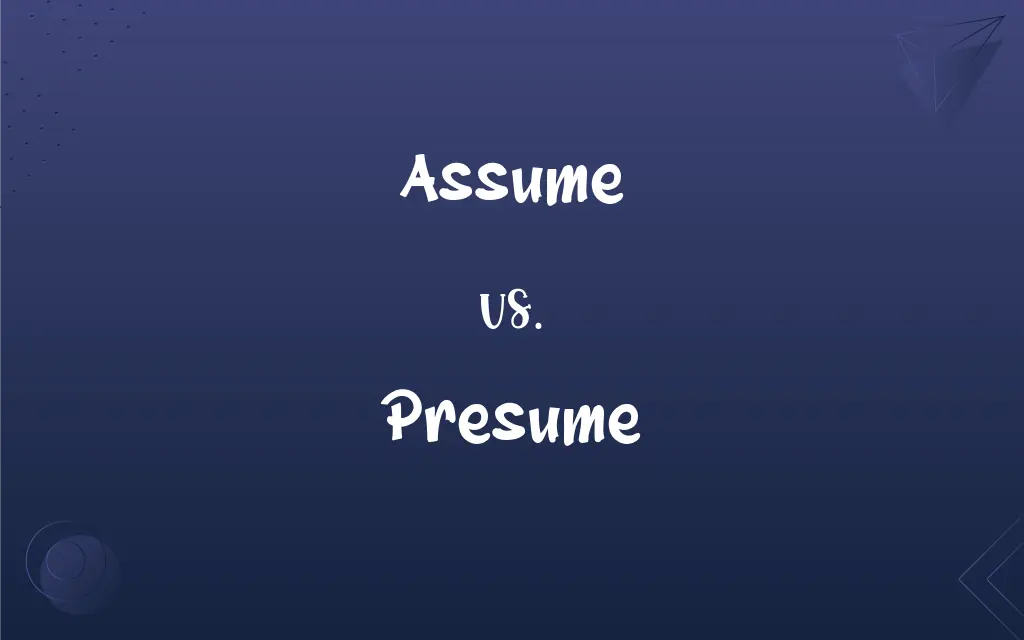Assume vs. Presume: What's the Difference?
Edited by Aimie Carlson || By Harlon Moss || Updated on October 25, 2023
Assume means to accept without proof; presume implies acceptance based on probability or reasonable grounds.

Key Differences
Assume and presume both pertain to believing something without concrete evidence. However, the reasons for these beliefs differentiate the terms. Presume often leans on the side of probability or prior evidence, while assume takes on a more generalized stance.
Assume generally means to take for granted without any specific proof. For example, if someone doesn't show up for a meeting, one might assume they forgot. Presume, in contrast, would mean they have a particular reason to believe so, like having witnessed the person's forgetful behavior before.
Another distinction lies in the level of certainty. While both words lack concrete proof, presume often carries a higher degree of certainty than assume. For instance, based on dark clouds, one might presume it'll rain. If they just think it might rain without observing the sky, they're assuming.
The legal realm provides another differentiation. "Presumed innocent until proven guilty" indicates a legal standard where an individual's innocence is accepted until evidence proves otherwise. It doesn't mean they're assumed innocent, which would lack the structured basis of presumption.
In daily usage, these words are often used interchangeably. Still, their nuanced differences revolve around the level of confidence and the reasons behind the belief. Assume lacks specific grounds, while presume has a basis, even if it's not concrete proof.
ADVERTISEMENT
Comparison Chart
Basis
General belief without specific grounds.
Belief based on probability or reasonable grounds.
Certainty Level
Often lower certainty.
Typically higher certainty.
Common Context
Making generalizations.
Making educated guesses.
Legal Usage
Not commonly used in legal terms.
E.g., "presumed innocent until proven guilty."
Origin of Belief
Lacks a specific reason.
Has some basis, even if not solid evidence.
ADVERTISEMENT
Assume and Presume Definitions
Assume
To adopt a particular role or position.
He assumed the role of a leader.
Presume
To take for granted with a higher degree of certainty.
Seeing the dark clouds, she presumed it would rain.
Assume
To undertake a responsibility or obligation.
She assumed the debts of the company.
Presume
To venture without actual authority or permission.
You shouldn't presume to know her intentions.
Assume
To adopt a certain appearance or form.
The ceremony assumed a solemn tone.
Presume
To act or proceed upon a presumption.
He presumed to speak on their behalf.
Assume
To suppose to be true without concrete evidence.
We can't just assume his guilt.
Presume
To accept as probable or likely in the absence of proof.
We can't presume the outcome.
Assume
To take for granted without verification.
She assumed he knew the way.
Presume
To believe based on probability or prior experience.
Given his background, I presume he's qualified.
Assume
To take for granted; suppose
The study assumes that prices will rise.
Presume
To take for granted as being true in the absence of proof to the contrary
"I presume you're tired after the long ride" (Edith Wharton).
FAQs
Are assume and presume synonymous?
While often used interchangeably, they have nuanced differences in basis and certainty.
Which word indicates a stronger belief?
Presume typically carries a stronger belief based on some form of reasoning.
Is assuming always without reason?
Assumptions often lack specific grounds, but there may be vague reasons behind them.
Which word implies an educated guess?
Presume often pertains to educated guesses.
Why is "presumed innocent" a legal term?
It reflects a cornerstone of legal systems: one is innocent until proven guilty.
Do assumptions always lack a basis?
Assumptions often lack specific grounds, but there might be general reasons behind them.
Can you use both words in legal contexts?
Presume is more common in legal contexts, e.g., "presumed innocent."
Is "presumption" related to "presume"?
Yes, "presumption" is a noun form of "presume," indicating an act or instance of presuming.
Which is riskier: assuming or presuming?
Both have risks when done without adequate basis, but assuming often has less specific grounding.
Can one assume a role?
Yes, "assume" can mean adopting a role or position.
Can both words be verbs?
Yes, both "assume" and "presume" can act as verbs.
Does "assume" have Latin roots?
Yes, it originates from "assumere," meaning "to take up."
Is presuming always right?
No, presumptions, even if based on reasoning, can still be incorrect.
Is it negative to presume?
It depends on context; presuming without adequate basis can be seen as impolite or hasty.
What's the opposite of assuming?
In some contexts, "confirming" or "verifying" can be opposites.
Can you replace "presume" with "assume" in all sentences?
Not always; while often interchangeable, context can demand one over the other.
Are these words formal or informal?
Both words can be used in formal and informal contexts, depending on the situation.
Can presumptions be challenged?
Yes, like assumptions, presumptions can be questioned and challenged.
Can "presume" mean acting without permission?
Yes, it can indicate venturing without actual authority.
Is assuming based on evidence?
Assumptions may or may not have evidence; they often lack specific verification.
About Author
Written by
Harlon MossHarlon is a seasoned quality moderator and accomplished content writer for Difference Wiki. An alumnus of the prestigious University of California, he earned his degree in Computer Science. Leveraging his academic background, Harlon brings a meticulous and informed perspective to his work, ensuring content accuracy and excellence.
Edited by
Aimie CarlsonAimie Carlson, holding a master's degree in English literature, is a fervent English language enthusiast. She lends her writing talents to Difference Wiki, a prominent website that specializes in comparisons, offering readers insightful analyses that both captivate and inform.































































